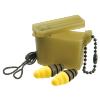Started basic at Ft Polk in Jun 67; we had ear plugs issued to us (in the round plastic container jcwit mentioned) but were not fitted, and usually fit poorly. Mine were nuisances and didn't work well at all, consequently, I now have sensorineural hearing loss along with the tinnitus (ringing in the ears). We always had to have them in training, but it was strictly for "the book", as in "by the book." After BCT & AIT, no one really cared. Things have changed for the better, and the AF does custom fitting in the Public Health flight; I presume the Army is less individualized, but the Combat Arms Ear Plugs bds posted look effective. On the plus side, the VA will give me some super German hearing aids that cost around $3000; on the minus, it gets old being unable to understand conversations in a room with several people talking and all the background noise. I hope our current service members fare better.




